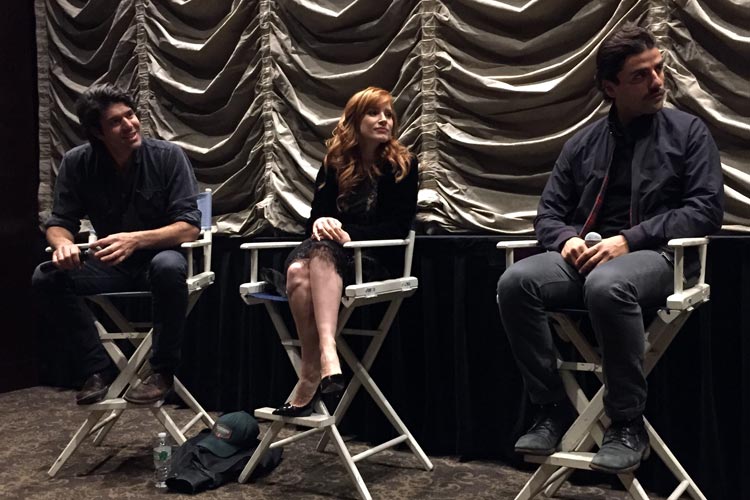The following questions and answers are excerpted from a conversation that followed the NBR screening of A Most Violent Year.
Mr. Chandor, why did you want to bring this story to the screen?
It was sort of two ideas that ran into each other. There was this core story that I had been working on for many years – probably six or seven years, actually – about a husband and wife who ran a business together. Actually, that was sort of inspired by parents of friends of ours who ran a car dealership empire all over the southern United States, and I thought it was fascinating how personal drive and ambition become merged into a family business and personal life. And then I also noticed that I kept getting offers for movies that relied heavily on violence, which I found strange and interesting. So I decided to explore these two topics in a film.
“The clothes are suits of armor.”
Ms. Chastain, can you talk about your first impressions of Anna?
The wonderful thing about working with J.C. is that everything is constantly evolving. And I remember at one point he said to me – after I was already attached – “I have a great idea with the deer: She’s going to shoot it!” And to me, that really busted the character out. Once she shoots that deer, it’s just understood that this chain reaction is going to happen where she’s really starting to be who she is. What I loved about the way that he wrote Anna is that even though it’s New York City in 1981 (it’s definitely a man’s world), and even though she wants to be with the most powerful man in the room (which is usually her Dad, actually, when he’s there), when she feels that her husband is not acting as he should in order to be this kind of man… she steps up and becomes the most powerful man in the room herself! She’s not just ‘the wife’ sitting at home supporting her husband. She’s actively participating in the world around her. She’s doing so much behind the scenes that you don’t even realize, and J.C. brought this out in the script in the most wonderful way. It’s such a great experience to work with someone for whom the film and characters are developing as we go.
Mr. Isaac, how did you start to develop your character?
He’s a very formal character – he’s written that way, brilliantly, by J.C. – and he doesn’t give up his secrets easily. It was difficult to claw through that. You don’t know really where he’s from, he intentionally doesn’t reference that. Being Cuban myself and from Miami helped somewhat, but getting to the emotional core of him was a challenge. One of the great things that J.C. said to me early on, when I would ask questions like, “what’s he feeling about this,” J.C. would just say, “I’m not sure… but his hair! It’s always straight up.” And I would press on with, “OK, but what’s he want?” And J.C. would reply, “I don’t know, but his suits…” And those things reveal a lot about the man. The hair, the suits, the matching cars, they’re defensive elements. The clothes are suits of armor. They weren’t about vanity or fashion, they were strategic. They’re less about what they actually are, and more about what they represent to the enemy. They are elements carefully considered by someone with confidence and a singular vision of how he wants to portray himself to the world. And these insights really influenced how I approached the character.
One of the most interesting aspects of the story is that this couple is moving to a big house in the suburbs while also working so hard to build a business in Brooklyn.
Absolutely. ‘White flight’ was destroying the tax base of the city at that point, and these characters followed suit. And yet, their business was based in the city. So while they’re personally evacuating the city, they’re also making a huge investment in the city, which is a highly optimistic thing to do. It’s that ambition and optimism that really takes guts—to go against the grain when the rest of the world is going another way.

